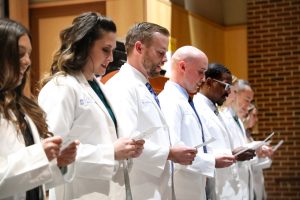The Physician Assistant Studies program, part of the Department of Allied Health Sciences, welcomed twenty students to the class of 2021 with a white coat ceremony on January 16, 2020. This year’s cohort of students is one-quarter veterans, and nearly forty percent were raised in a medically underserved area.

During the ceremony, Paul Chelminski, the PA program director, said as future PAs, students will be routinely confronted with competing responsibilities and challenges. “We will have to sift through and triage a lot of data, try to separate the wheat from the chaff, and try to maintain our composure in the face of suffering and complexity,” Chelminski said.
Chelminski also recounted a story about one of his patients who made an off-hand comment during an appointment about fatigue during exercise. Chelminski ordered a routine stress test.
He said he later received a hand-written note from the patient, thanking him for his prompt and assiduous care. As the patient explained, the care had resulted in preventative measures for a heart issue that could have otherwise escalated into an emergency.
“I keep this letter to remind me that the little things count,” Chelminski said. “I keep it to remind me that cognitive and technical prowess in medicine do not constitute clinical excellence in the absence of pharmacological doses of gratitude and humility.”
Chelminski said the measure of success for PAs is the ability to handle contradiction and paradox.
“I started out by telling to ‘not sweat the little things,’” Chelminski said. “I am finishing by telling you to do the little things right.”
The program is made possible because of the unprecedented public-private partnerships that have been formed and the generous donations from Blue Cross NC, the William R. Kenan, Jr. Charitable Trust, the Eddie and Jo Allison Smith Family Foundation, and the leadership and support of Mary Susan Fulghum, MD, and her late husband James Fulghum, MD.
Paul Chelminski, MD, MPH, FACP, has served as PA program director since its inception in 2015.
Class of 2021 student statistics
-
25 percent are veterans (national average is <4 percent)
-
35 percent were raised/live in a medically underserved area
-
25 percent are underrepresented minorities
-
Nine represent UNC System schools
-
Eight represent NC community colleges